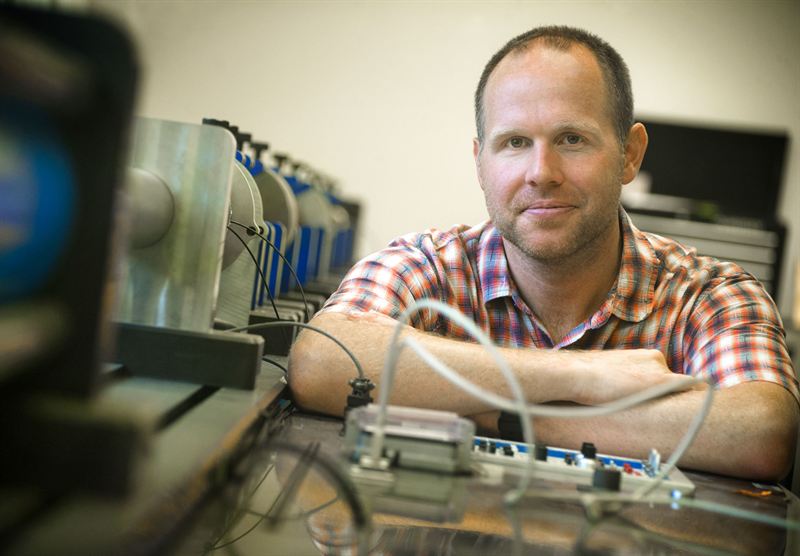CAREER grant to help UT Arlington professor study earthquakes, create teacher Geocorps

A UT Arlington assistant professor of earth and environmental sciences has been awarded up to $400,000 from the National Science Foundation Faculty Early Career Development (CAREER) Program to study how rock structures react to events such as earthquakes, meteor impacts and explosions.
W. Ashley Griffith also will use the new grant to partner with Teach for America – Dallas - Fort Worth to create the TFA Geocorps. His project will involve secondary school teachers in research and provide them with geophysics-based curriculum for their classrooms. Griffith was a Teach for America corps member before earning his PhD. He came to The University of Texas at Arlington College of Science in Spring 2013.
"NSF CAREER grant recipients like Dr. Griffith are respected for their commitment to excellence in the lab combined with a passion for furthering science education in the community," said James Grover, interim dean of the UT Arlington College of Science. "His research in geophysics is helping add a new dimension to what is known about the Earth's movements. By involving Teach for America educators, he'll also ensure that future scientists get the preparation they need to make their own contributions."
Griffith's CAREER proposal outlined a modern approach to examining what geophysicists refer to as loading rates. Those are the rates at which pressure on rocks build from outside forces like the movement of tectonic plates. The pressure leads to the "slip" associated with earthquakes as well as other structural failures.
Due to the slow movement of the Earth's tectonic plates, researchers have typically focused their attentions on slow loading rates. Griffith, in contrast, will focus on the extremely fast loading rates that characterize the progression of energy in an earthquake, meteor, explosion or other impact.
Griffith's work will feature a combination of methods. He will examine clues left in the "rock record" of the effects of catastrophic events and compare them to rocks that are deformed under experimental conditions in the lab.
"Our goal is to look at how a rock behaves in response to fast loading rates and relate that behavior to its mineral composition and microscopic structure," said Griffith. "We believe the characteristics are linked. If that proves true, this work could lead to a better understanding of the physics of past earthquake and impact events, increasing our predictability of hazards associated with future such events. It could also allow engineers to design more effective structures in mining, drilling and military settings."
Only about 27 percent of the CAREER grant requests submitted to the NSF for geology in Fiscal Year 2013 were funded.
Because of his experience with Teach for America, Griffith knew that the nonprofit could achieve the "broader impacts" that are part of the CAREER program. Teach for America corps members work in low-income schools in rural and urban areas for two years in order to make an impact where qualified teachers are needed.
Earlier this year, the Army Research Office awarded Griffith up to $357,330 for an investigation of the energy needed to fracture rock at the surface and below ground. He will team with the Advanced Materials and Structures Lab (AMSL) in the Department of Mechanical & Aerospace Engineering at UT Arlington. They will use X-ray computed microtomography, also known as MicroCT, to create a 3D model of the fracture networks that his lab tests produce in a sample rock. He also receives funding from the Southern California Earthquake Center.
###
About The University of Texas at Arlington
The University of Texas at Arlington is a comprehensive research institution and the second largest institution in The University of Texas System. The Chronicle of Higher Education ranked UT Arlington as the seventh fastest-growing public research university in 2013. U.S. News & World Report ranks UT Arlington fifth in the nation for undergraduate diversity. Visit http://www.uta.edu to learn more. Follow #UTAdna on Twitter.
Tags:


